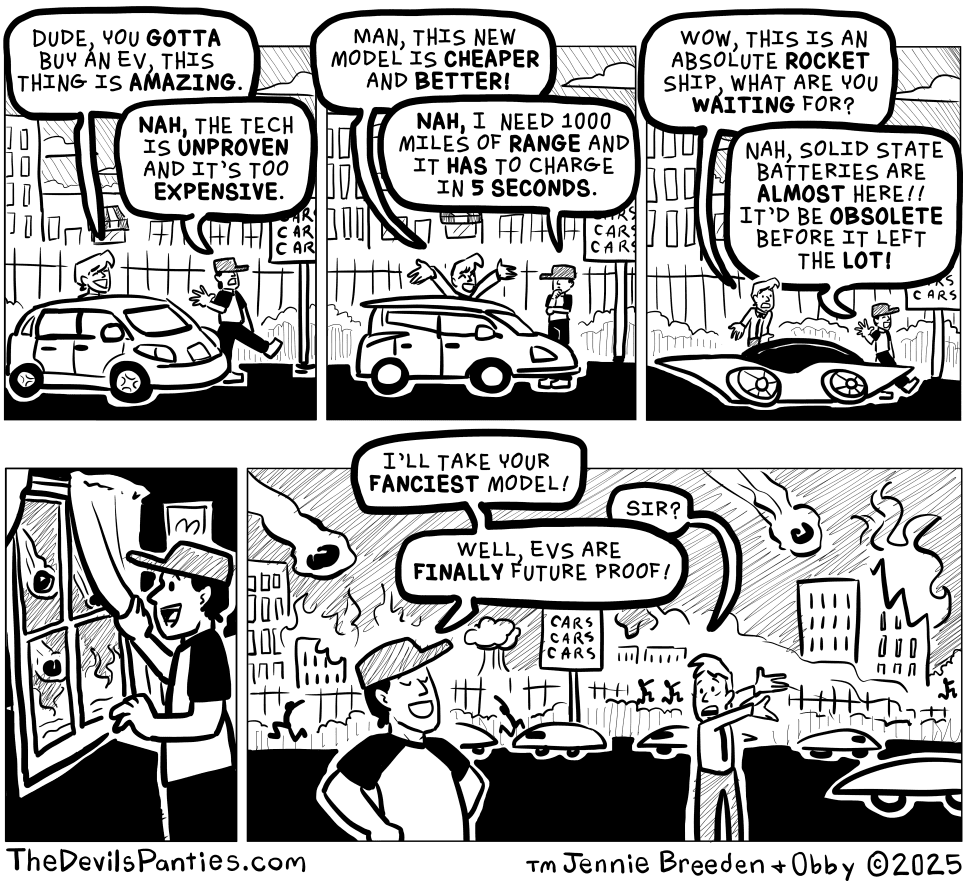this post was submitted on 05 May 2025
185 points (85.7% liked)
Comic Strips
16442 readers
1999 users here now
Comic Strips is a community for those who love comic stories.
The rules are simple:
- The post can be a single image, an image gallery, or a link to a specific comic hosted on another site (the author's website, for instance).
- The comic must be a complete story.
- If it is an external link, it must be to a specific story, not to the root of the site.
- You may post comics from others or your own.
- If you are posting a comic of your own, a maximum of one per week is allowed (I know, your comics are great, but this rule helps avoid spam).
- The comic can be in any language, but if it's not in English, OP must include an English translation in the post's 'body' field (note: you don't need to select a specific language when posting a comic).
- Politeness.
- Adult content is not allowed. This community aims to be fun for people of all ages.
Web of links
- !linuxmemes@lemmy.world: "I use Arch btw"
- !memes@lemmy.world: memes (you don't say!)
founded 2 years ago
MODERATORS
you are viewing a single comment's thread
view the rest of the comments
view the rest of the comments

I did a quick googling to get some numbers, and it looks like in 2022, 28% of US emissions were from transportation. Another 25% was from electricity generation. Fix those two things alone and you've more than cut your emissions in half.
Getting people to switch to electric cars will go a long way towards slowing down/stopping climate change, and is actually doable. In North America, getting everyone to change their lifestyles, redesigning city layouts, and actually building the public transportation to support it is a process that will take generations to complete. We don't have that kind of time. Better to get people into electric cars now, while we work towards the long term goal of not needing them.
An EV still produces about 30% of the lifetime CO2 emissions of an equivalent ICE, assuming a 100% clean grid [1]. So unless we change the systems that are putting more and more cars on the road, and increasing vehicle miles traveled each year, emissions will continue to rise.
Cars only really became available to the public in the 20s or 30s. I bet your city was overrun by cars by the 50s. Cities drastically changed over just a few decades. Why should it take significantly longer to go in the reverse direction? Other than a lack of political will.
edit: I'm not against EVs overall. I know there will always be a need for cars/trucks to some extent, and I think they should all be EVs. But don't let that be a distraction from actual meaningful climate action.
So that source specifically states that the production emissions are a best estimate, and not thoroughly examined in the scope of that study. In the not-so-theoretical case where the grid is carbon free (there are locations in North America where this is very close to true) that completely changes the math on the production emissions. That study chose not to look at that, and instead choose a flat rate that reflected the current average.
Also, I'm not saying that electric cars are the proper solution; I'm saying they are the fastest solution. They are a stop-gap because the proper solutions are going to take too long to implement.
I think a bigger part of the production emissions come from further up the supply chain than the factory. Such as extraction, refinement and shipping of the lithium and cobalt required for batteries. That is also what makes it hard to estimate.
My point was that switching to EVs will not make transportation emissions disappear.
Cities should be carless (only renting cars should be allowed), rural areas should be EVs only, and only if you have photovoltaics on your roof.